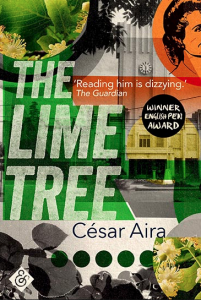
Argentinian writer César Aira has been on my radar for while. I don’t think I have come across any negative reviews of his work so far. On the contrary, most of his readers were more than enthusiastic. Aira is known to be one of the most prolific writers. To this day, he’s written over one hundred books. Obviously, his books are mostly on the short side, nonetheless, it’s an impressive number. It’s also a number that makes it difficult for first time readers to choose a book. Since I’d read a few rave reviews of The Lime Tree, I decided to start with that.
The Lime Tree tells a fictional childhood memoir, set right after the fall of Peronism. The narrator is an older man, looking back on his childhood, exploring the role of History on his personal history. The distinction between History with a capital H and history is a major theme of this novel. The way families, in this case, poor Argentinian families are influenced by the History of the country, its politics, is central. For someone who knows little about Latin American – or Argentinian history – it was very interesting. The book explained very well how someone like Perón could be so popular with the working classes who were hoping for social mobility.
Perón and the fall of Perón, were important for the narrator’s family and therefore also for the narrator himself. But there were other things that would play a role. His father, a very good-looking man, was ‘black’, probably of Indian descent, while his mother is described as dwarf-like and very ugly. His father, an ardent Peronist, suffered from his nerves, after the end of Peronism, and hardly spoke while his mother was a loud, chatty woman.
This duality might help to explain his marriage. My mother was white; she came from a respectable, middle-class family, and if she had acquiesced to an alliance with the ‘black’ populace, it was because her physical deformity made it impossible for her to marry at her own level. The alternative would have been to remain unmarried, and as far back as I can remember, she was always expressing her horror at the condition of ‘spinster’.
For the reader, many of the episodes in the novel are amusing, but when you look at them closely, you notice how much pain and tragedy these parents experienced.
Some readers have complained that Aria doesn’t write chronological tales and that it can be quite challenging to read him. I didn’t mind this at all. Reading The Lime Tree was like listening to the monolog of an older relative who is reminiscing, telling stories of his life, jumping from one topic to the next but always picking up the lost thread again. As with many elements of this book, there’s an echo of this reading experience in the text.
Back then, people had so much time, they would tolerate the craziest monologues. I can’t have been the only one who listened to them with pleasure.
It was fascinating to learn more about a place, Colonel Pringles, in Argentina, during a specific period, the 50s. I found Aria’s approach to telling a story interesting because it mirrored his topic – History and personal history and the way they influence each other. And there are many wonderful, colourful scenes and story elements that I liked a lot, like the description of the way they lived – in one room of an abandoned inn. I would actually love to see this made into a movie.
Will I read more of Aira? It’s possible, but I don’t think I would read him in English again. I just felt very far from the original text. That doesn’t mean the translation isn’t good. I’m sure it is. I just wanted to hear the original cadence. I noticed that there’s a new collection in Spanish due to come out in May – here. It contains ten of his short books. Maybe I’ll pick it up.
